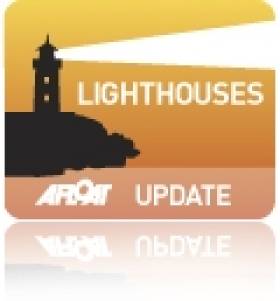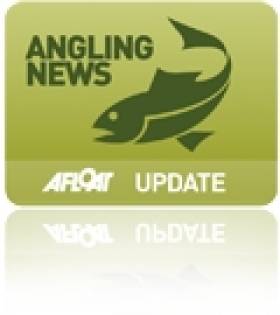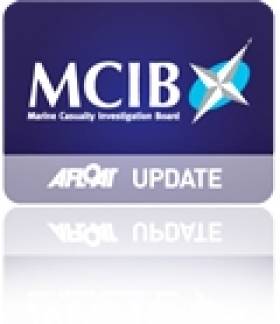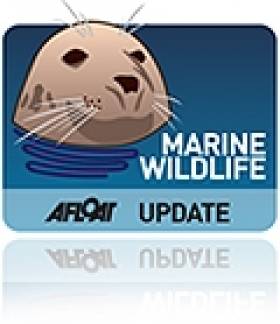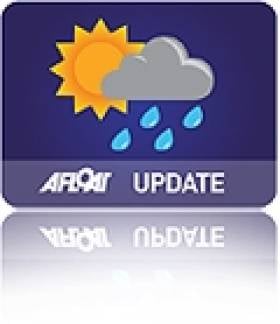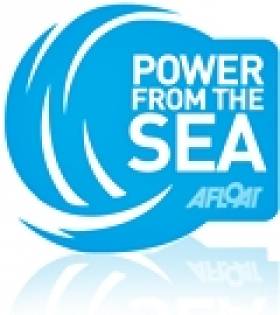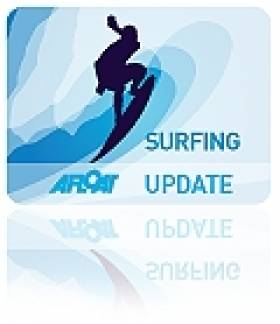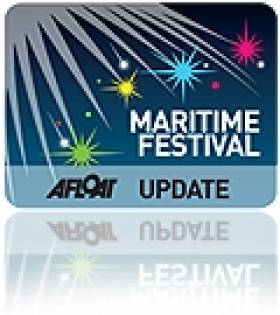Displaying items by tag: 2011
Loop Head Lighthouse Will Open To Public in 2012
#LIGHTHOUSES - Loop Head Lighthouse in Co Clare, is set to re-open to the public later this year following a successful trial scheme last summer.
As The Irish Times reports, Clare County Council opened the lighthouse for an 11-week trial period last July with the support of the Commissioners of Irish Lights, Shannon Development and Loop Head Tourism.
Some 17,000 people took up the invitation to visit the 23-metre beacon, which is still in use as a navigational aid, as previously reported on Afloat.ie.
The consortium is now looking for consultants to help expand tourism the facility with an exhibition and interpretation plan.
Four News Records in Irish Specimen Fish Committee's 2011 Report
#ANGLING - The Irish Specimen Fish Committee's annual report for 2011 features catch details for 587 specimen fish as well as four new records, according to The Irish Times.
The report comes ahead of the committee's annual awards event at the Red Cow Moran Hotel in Dublin on Saturday 3 March, recogising those anglers who work hard to catch and record the biggest fish of each of Ireland's species.
Those in line for awards include Terry Jackson, who caught a 2.1kh roach/rudd hybrid in the River Lagan; Dutchman Jan Vrieswijk who landed a 1.33kh blackmouth dogfish in Red Bay, Co Antrim; and Noel Lane for his 2.83kg thin-lipped mullet from Cork Harbour.
The Irish Times has more on the story HERE.
#MCIB - The decision to set out in poor weather, coupled with limited safety instruction, led to the tragic death of a Romanian angler on Lough Mask last summer, according to a report by the Marine Casualty Investigation Board (MCIB).
Mircea Ungur drowned after the angling boat he was in capsized in choppy waters brought on by squalling Force 8 winds on the afternoon of 8 May 2011.
Ungur had a tracheostomy tube in his throat resulting from a previous battle against throat cancer, and drowned after taking in water through this tube, the MCIB concluded. It was also found that most of his companions and the guide knew nothing about the tube.
At the time of the incident, Ungur had been on an angling holiday in Co Mayo with five colleagues accompanied by a fishing guide. On the morning of 8 May the group set out from Cappaduff in Tourmakeady on two boats, following a brief discussion about fishing and safe departure from the pier.
Winds were already reaching Force 4-6 when the group departed and sought a sheltered area of the lough to fish. After lunch winds had picked up to Force 8 and the guide signalled for a return to Tourmakeady.
At around 1.5km from the pier at Cappaduff, a wave swamped the leading boat that contained Ungur, a companion and the guide. All three on board, who were wearing buoyancy aids, went into the water.
Ungur was the first taken on board the other boat after some 10 minutes in the water. He was not moving or communicating with the others, and CPR was not administered until the boat reached the shore 20 minutes later. Ungur was pronouced dead just before 3pm.
The report concluded that the group had departed despite reservations among them about the poor weather, which had been correctly forecast that day. There was also little discussion with the anglers about their level of boating experience, the weather, or any disabilities that would affect their safety on the water.
The MCIB recommended that a full safety briefing should be given to all those hiring angling boats. It also urged the enforcement of safety regulations and certification for recreational water craft.
The full report is available to download as a PDF from the MCIB website HERE.
Record Year for Whale and Dolphin Strandings
#MARINE WILDLIFE - The Irish Whale and Dolphin Group (IWDG) says 2011 was a record year for whale and dolphin strandings, according to The Irish Times.
IWDG co-ordinator Dr Simon Berrow confirmed a total of 160 strandings reported by year's end.
"This is by far the highest total for the number of stranding records and the third highest total for sighting records since the IWDG recording schemes were established in 1991," he said.
The 2011 record compares to a figure of 92 stranded cetaceans in 2010 - a number much lower than previous years.
Dr Berrow explained to BBC News: "The figures for 2010 were very low, and, we think, this was due to the easterly winds that year. But now we are back up to the kind of level we expect."
Stranding records in 2011 were characterised by a very high peak of common dolphin strandings during February and a high number of porpoise strandings during the winter.
Meanwhile, Dr Berrow considered the latest sightings record "very impressive" given the exceptionally poor sea conditions during autumn and winter.
More than 1,500 whale and dolphin sightings were made in 2011 around the entire coastline of Ireland despite the bad weather.
Easy Swim at Forty Foot on Warmest Christmas Day in Years
#WEATHER - Those hardy Yuletide bathers at the Forty Foot in Dublin didn't need to be so brave this year, as Ireland experienced one of the warmest Christmas Days on record.
Just one year ago Ireland was in the grip of a deep freeze. But as the Irish Independent reports, temperatures on Sunday last rose to as much as 14.4 degrees in Co Cork.
It's been almost a decade since late December temperatures reached such levels, when Christmas in 2002 saw highs of 14.6 degrees according to Met Éireann records.
Sunny spells on the east coast brought out the polar bear plungers to Sandymount and the Grand Canal as well as the famous Forty Foot bathing spot in Sandycove.
The Irish Independent has more on the story HERE.
Oil and Gas Firm Issued Licence to Explore Off Dalkey Island
#POWER FROM THE SEA - Irish oil and gas firm Providence Resources has been awarded a licence to explore near Dalkey Island, the Irish Independent reports.
The standard licence issued by the Department of Communications, Energy and Natural Resources lasts for up to six years, split into two three-year phases.
Providence hopes to drill at least one well during the initial phase in the Kish Bank Basin, where previous exploration drilling confirmed the presence of oil suitable for petroleum production.
The group is also applying for a foreshore licence for the purpose of well site surveys and drilling operations.
As previously reported on Afloat.ie, Providence Resources is one of the 12 companies that were awarded 13 Licensing Options between them in the 2011 Atlantic Margin Licensing Round.
The Irish Independent has more on the story HERE.
Video Shows Best of West Coast Kitesurfers
#KITESURFING - Irish kitesurfing's Mulranny Crew have had their best clips for 2011 compiled on YouTube.
The freestyle crew, based in the West of Ireland, describe themselves as "group of enthusiastic local riders, who try to push themselves harder every time they hit the water."
The group includes Neil McKenna, Kevin Cowley, Rory Stoney, Padraic Doherty, Nick Isherwood, Gavin Hughes, Fionn Wandel Brannigan and Barry Grogan.
See the Mulranny Crew in action on YouTube below:
Easkey Britton Talks About Her 'Whirlwind' Year in Surfing
#SURFING - Irish surfing ace Easkey Britton sat down with Cooler magazine to chat about her "whirlwind" last few months.
Britton, who comes from the highly regarded Donegal surfing dynasty, has spent much of this year jugging her studies towards a PhD in marine science with her training for the European Surfing Championships in her home county this past September.
"I don’t know how anyone survives their PhD without being able to jump in the sea and catch some waves," she says. "It clears my mind, renews my energy – the best ‘study breaks’ you can get. And I appreciate the sessions I have a lot more."
Now heading into winter, with the surf getting bigger every day, she's in training with tow partner Neil Britton for the second Tow-In Surf Session at Mullaghmore Head.
She says of last year's inaugural competition: "The conditions were unreal. Huge, clean, light winds, sunshine. A very rare combo. It was our first ever experience of something like that. The crowds covering the headland were massive, it felt like an amphitheater, or being a gladiator in the arena!"
Britton also talks about how her family has been a big inspiration to her both in her life and her accomplishments on the surfboard.
Cooler has more on the story HERE.
Dr John de Courcy Ireland Remembered at Connemara Maritime Festival
Ireland's leading maritime histortian will be remembered during Conamara Sea Week, which starts next Friday.
The 10-day programme celebrating the west of Ireland's rich maritime heritage kicks off just two days after the centenary of the late Dr John de Courcy Ireland, who tirelessly documented Ireland's relationship with the sea in parallel with a distinguished career as a political activist.
According to The Irish Times, he will be remembered during a conference on 'The Sea as Inspiration' on Saturday 29 October in Letterfrack, Co Galway.
Education and arts are major themes of the maritime festival, which will also feature an exhibition of works from emerging artists.
For more details visit the website of the Conamara Environmental Educational and Cultural Centre at ceecc.org.
Portugal Takes Top Honours at Eurosurf 2011
Team Portugal were crowned European Surfing Champions at the final day of Eurosurf 2011 in Bundoran yesterday.
It's the first time the Portuguese have held the title since 1997, which is also when the event was last hosted in the Co Donegal seaside town.
Portugal won three of the seven different categories, with two second-place finishes, one third place and one fourth.
Their surfers fought tooth and nail in a week of competition that was dominated by France, who made a bold statement of intent on the opening day by scoring eight out of the best 15 waves - and led the pack until the closing sessions.
Meanwhile Team Ireland did not finish too badly, placing a respectable sixth in the final tally.
Ashleigh Smith made the biggest mark for the Irish, being narrowly beaten into second place in the women's bodyboarding division by Portugal's Catarina Sousa.
“We’ve been delighted with how the week has gone for Eurosurf," said Eurosurf press officer Shane Smyth. "If we were to draw up a blueprint for a surf competition considering waves, weather and organisation we would have nailed it."
More details of results are available on the Eurosurf website HERE.
The BBC News website also has an image gallery of the week's action HERE.


























